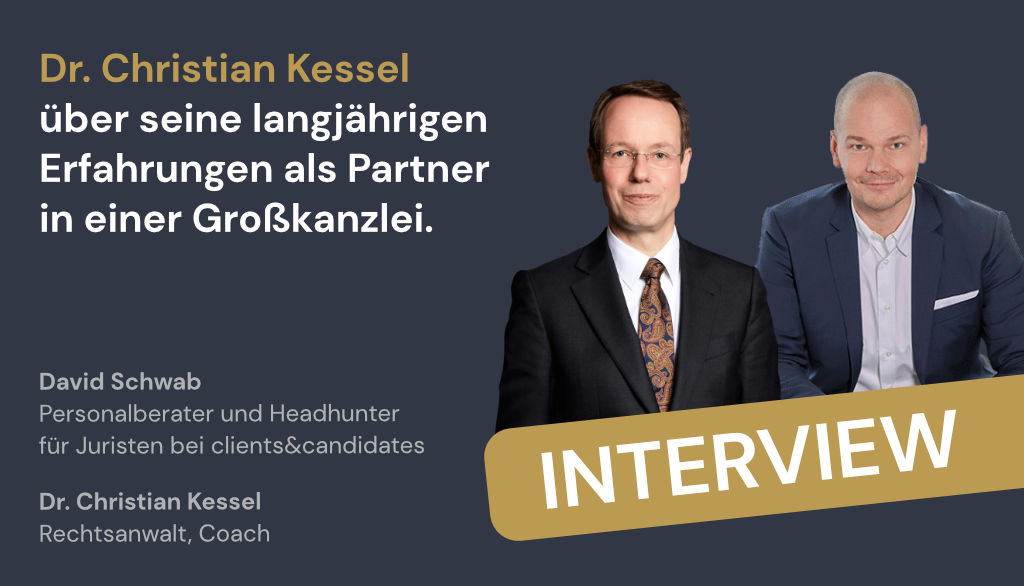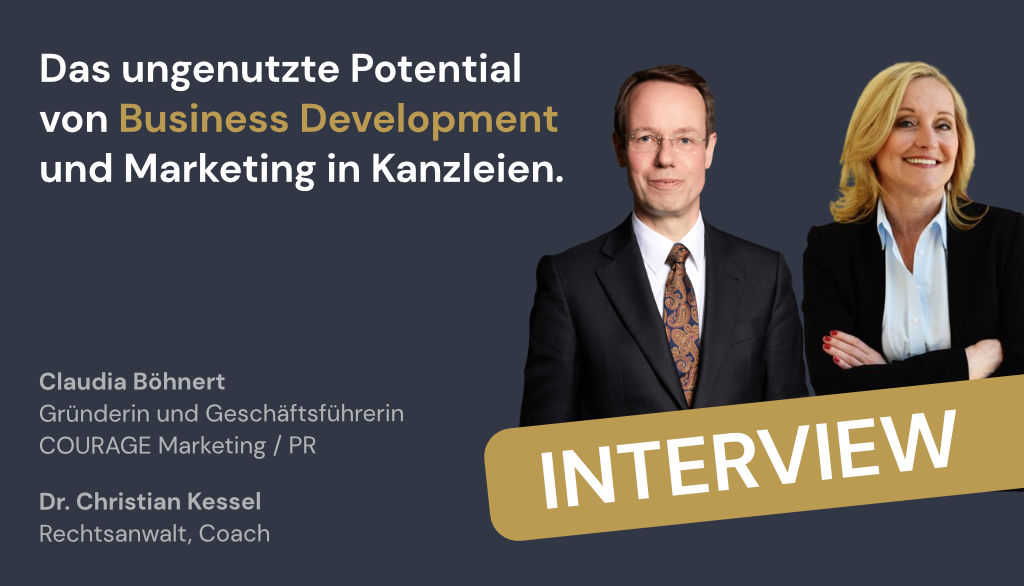Some basics for personal development to become a successful business developer.
N.B.: This is a slightly amended version of a series of articles for a German digital legal periodical (Deutscher AnwaltSpiegel – www.deutscheranwaltspiegel.de) Therefore, it very much refers to business development in a law firm context. However, all principles set out and all examples mentioned apply directly or by analogy to all other professional services providers as well.
Against the background that, in my opinion, the gold standard for successful business development is the acquisition of new clients on the market (i.e. not primarily based on the development of existing contacts of the firm or the partners) in a previous article Business Development strategy we discussed vision and strategy as prerequisites for successful business development. In the following, we will look at some essentials for implementing the chosen strategy. In A further article, we will go into more detail about what it means to be “intentional” in business development and what challenges – especially our own, inner challenges, blockages or obstacles – there may be and how they can be overcome.
Important aspects for the successful implementation of business development strategies
External factors
How does a vision become reality? How is the business development strategy derived from the vision implemented? What short-term and/or long-term goals can I set? What measures can I take?
Internal factors
And perhaps equally important: What steps are necessary to positively change one’s own behaviour? How does someone who has never, only occasionally or at best opportunistically done business development become someone who does business development continuously, consistently, actively and with pleasure? And even becomes good at implementing his or her business development strategy. In other words: How do I become a good, even successful and enthusiastic business developer?
Here are some business development suggestions that have worked well for me and many others:
1. Continuous business development
It is crucial that business development takes place continuously. Successful business development results from continuous activities in the implementation of the chosen strategy and the planned (and ideally written down) weekly goals and activities (like a strategic plan for each week or month)
Even “defeats” should not be allowed to deter you. If you continuously do business development, you will be successful and your turnover and team will grow.
If, for example, you only start with business development again after completing large instructions or cases that have lasted months or years (e.g. in transactions or litigation), you should not be surprised if the pipeline for new business is empty and does not fill up within days or even a few weeks.
In my opinion, anyone who plans to intensify business development (or to do it all) once business is just a little bit quieter, is adhering to a misconception: Ideally, i.e. in a successful team, there should never be such “pauses”. Conversely, when it is quieter, because (most) work has been discharged, the strategic mistake of not doing business development continuously becomes all the more apparent.
2. Goals for each week
For me, it has always worked well to write an agenda, a step plan, a strategic plan or simply a list of goals and measures for each week (or the next 2-3 weeks) and also to check off at the end of each week what I have done and what is still open. In this way, I can keep track of what has been done and was achieved; or alternatively, what has not worked and what needs to be re-considered. And I can adjust both my weekly goals or short-term strategic plan or if I learned valuable lessons, even my business development strategies.
3. Efficient business development
All business development activities should be aligned to maximize efficiency.
3.1 Multiple uses of any business development measures
If, for example, one succeeds in placing a presentation with PowerPoint slides at a conference, one can easily use it to write a learned legal article (i.e. with many footnotes etc.), place an announcement or summary in an industry-related trade journal as well as on LinkedIn etc., place a video with a summary of the essential topics or results on the internet, as well as, if possible, the (shortened) PowerPoint presentation. Ultimately, the aim is to reach as many target groups as possible with what you have developed. The time investment and the effort required for a presentation or speaking engagement or the organization of an event are too high and too valuable in relation to the free time that has to be sacrificed for it, not to get the most out of the same topic with only a little additional effort.
3.2 Reach as many targets as possible
Even if one makes an effort to acquire new clients in the market, this is often done with too much effort in relation to the return. If I plan to have lunch with a potential client (target) once a week, I might manage 45 appointments a year. These require an immense amount of organization and time. So, the question is how to reach the same 45 people “in one go” (and this possibly several times a year).
3.3 Carefully consider the number of meetings
Efficiency also includes holding only as many “sales” meetings as necessary with the same target company during the „sales“or acquisition phase and critically checking before each further meeting whether there is actually a prospect of winning work from them.
Conversely, you should also always weigh up how often a contact can be approached without your reaching out or following up being perceived as unpleasant or even harassing.
3.4 Management Tools?
For some, management tools such as balanced scorecards and time management tools may also help to increase their business development efficiency.
Everyone has to find out for themselves whether such tools can be of help. I myself have not used them.
4. Build personal relationships
Instructing you on a case, transaction or day-to-day advice requires trust. Trust, in turn, requires a relationship. For this, it is usually not enough to get to know each other superficially at a law firm event, a conference, a fireside chat or on social media.
All this can leave positive impressions, but the function of the trusted advisor, the deal/transaction facilitator, problem solver, or the trusted person who lets the client sleep well at night again also requires the right personal chemistry, the conviction that the street credibility is not only claimed in the pitch document or on the website but exists in reality and that a qualified team is available.
As in private life, all this requires time, interest, commitment to the potential client as well as active and conscious listening to find out what is on the target‘s mind or bothers him.
So you have to invest e.g. in personal conversations (also at conferences, seminars, meetings); video conferences; telephone calls; non-committal workshops in the offices of future clients, to name but a few relationships building activities.
5. Build specialisation and become a brand
In order to stand out in the mass of competitors on the market (and, if applicable, in the law firm for partnership), a clear profile as a specialist for an industry sector, an area of law or a niche is helpful. This can and should show what you are known for in the market, what you “stand for”, what your specific product or service comprises or why exactly YOU are the right advisor for the client’s business opportunities so that new clients from your target market will eventually contact you on their own accord due to your market reputation. By then, at the latest, you have become your own brand.
This specialization ultimately derives from the vision and should always be and remain aligned with it and the chosen business development strategy. It should not cover more than one or two industry sectors or areas of law. It is hardly possible to credibly present more than that on the market.
Presentations or speeches at events etc. in particular serve to establish yourself as an expert, specialist and even thought leader and will help to build up your reputation in the market. This also includes identifying new topics early on and placing them on the market. All of this also positions you ahead of the competition.
6. Successful business development through team empowerment
6.1 The need to involve the team
One of the biggest challenges is the time, energy and effort required to implement the business development strategies efficiently and effectively. As an associate or counsel, this is often easier to achieve on top of the billable work than as a partner. Partners have a multitude of internal tasks and obligations, are involved in the management of the team and the whole issue of invoicing clients is an additional challenge to the actual client work; therefore, there is often hardly any time and energy (not only physically but also intellectually) left for business development activities.
Partners who think that business development is the prerogative of partners and not a task for team members ( at least additionally or in support with own responsibilities), deprive themselves of further growth of their business.
6.2 Empowerment of the team
Successful business development at partner level includes the ability to empower team members to do their own business development and to create a corresponding culture.
Empowerment for these purposes is the ability to delegate tasks to the team members, motivate and advise them, but ultimately let them run on their own and implement their own business development strategies and merely be available to answer their questions.
Team members should learn not to rely on the firm’s own business development team or the partner but to implement their own common business development: develop their own vision and long-term business plan on the way to partnership. But even if a partnership is not yet their definite goal the team members should be deeply involved in the team’s overall business development strategies:
- develop their own weekly or monthly ideas for a strategic plan or business strategy and corresponding goals;
- consider and choose approaches to potential clients ( including a business owner if appropriate – don’t be shy and hesitant ) in a particular market or industry;
- identify their target audience for an event they are planning;
- identify or develop business growth opportunities for their targets that would generate long-term value and client satisfaction;
- and creating a product or service for sale that generates growth opportunities may also be part of it.
And some business developers may even create a different business line outside the partner’s or team’s key target market- out of personal interest or background; and a powerful partner supports that as well,
Thus each team member will discover own strengths, weaknesses and opportunities all of which cause him or her to grow into an accomplished business developer.
And each one will learn early on what are the typical business development tasks for oneself and when and how the firm´s marketing team can contribute.
Those who are motivated and empowered by a partner at an early stage learn business development naturally, gain self-confidence for it, see the fruits and successes for themselves and the team and lay the foundation for their own successful business development and creating growth
6.3 What it takes to be a powerful partner
Empowering team members can only be done by those (mostly) partners (or counsel) who are powerful themselves. In contrast, powerless is someone who wants to retain complete control, does not trust others or does not trust them with business development, is not willing to invest in his team, fears the further development of team members into partners due to their successful business development or even sees himself in competition with them.
6.4 The triple win results of empowerment
If team members are successful business developers, a triple-win situation is created for them, the partner and the whole team:
- the partner benefits financially from the success of associates or counsels until they become partners;
- associates/counsels strengthen their own business case through self-acquired business opportunities, new business and revenue growth (not to mention the sense of achievement when a new client is won); and
- the team as a whole learns to appreciate collaborative behaviour rather than a silo working mentality and the team spirit grows.
Empowerment of the team is not necessarily easy but can be developed into a personal leadership strength – if necessary with the help of experienced colleagues or external coaches.
In the next article, we will go into more detail on what it means to be “intentional” in business development and how challenges – especially internal ones – can be overcome.






